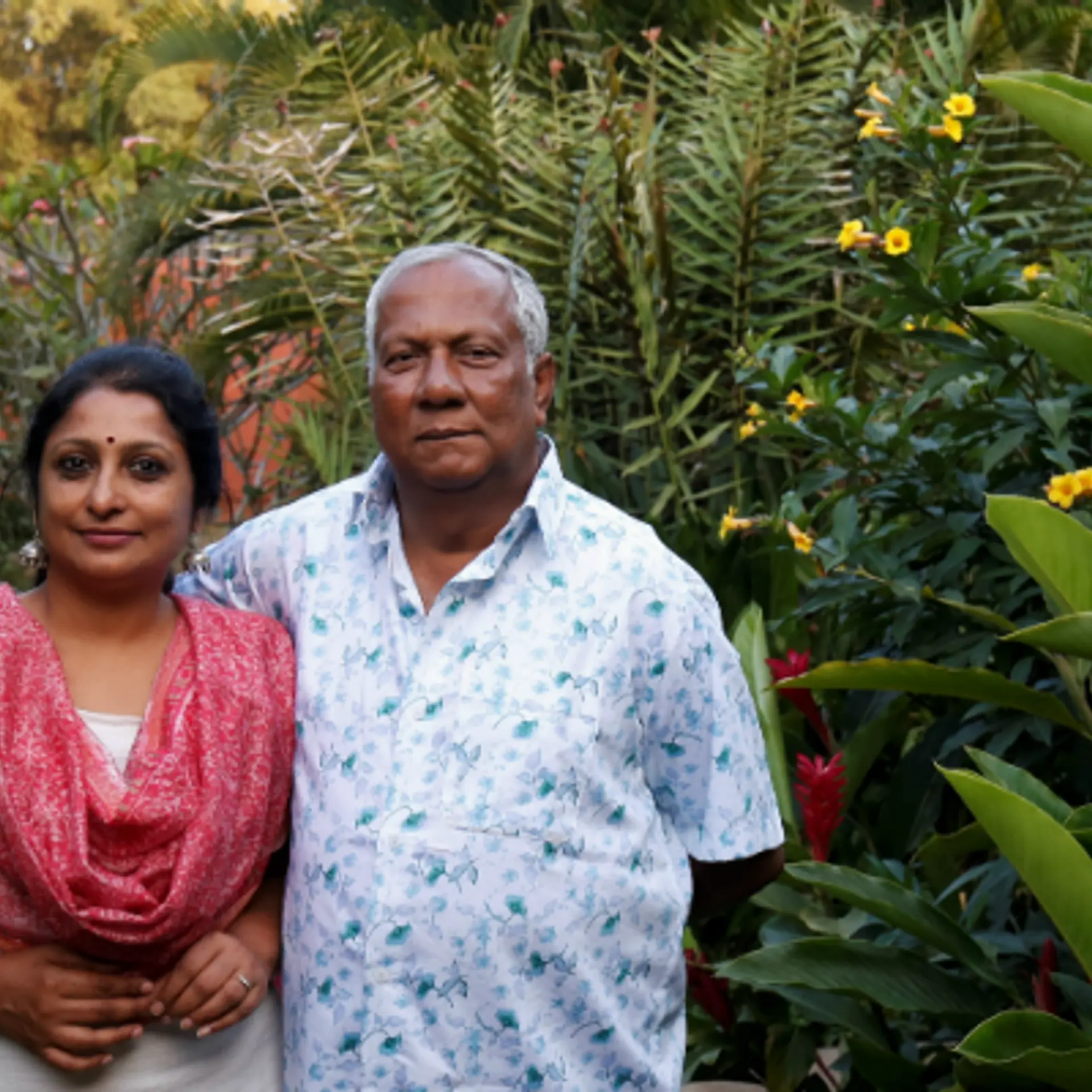This entrepreneur clocks Rs 24 lakh revenue by selling girls’ apparel and hair accessories online
Meghna Gandhi started Ribbon Candy in 2011 in Vadodara with Rs 25,000. Today, she has a team of six employees, and ten women who work from home.
When Meghna Gandhi searched for hair accessories for her daughter, she noticed that they were either imported from China or the US. Nothing of the sort was being made in India.
Meghna, a former investment banker and an avid embroiderer and crafter, took it upon herself to make a few hair accessories for her daughter and other little girls among family and friends. She ordered a few supplies online and started making the products.
“My products were well-received. I made the first collection entirely on my own and hosted a successful exhibition in Vadodara,” she tells SMBStory.
From here onwards, there was no looking back. Meghna invested Rs 25,000 to start Ribbon Candy in 2011 and put together a small team to produce handmade hair accessories.

Meghna Gandhi, Founder, Ribbon Candy
In 2016, her second daughter was born which further motivated Meghna to scale her business. She noticed a gap in the space of a comfortable party wear for little girls.
“I was not able to find 100 percent premium cotton, breathable, and skin-friendly garments for little girls,” she says.
This inspired her to start an apparel vertical under Ribbon Candy.
“The apparel segment was like a complementary business to hair accessories. The target market was the same - mothers who wanted comfortable and stylish apparel and accessories for their daughters,” she says.
In 2018-19, Ribbon Candy’s sales touched Rs 24 lakh. The company now has a team of six employees, and ten women who work from home.
Meghna now wants to scale the company and tap into a market characterised by growing awareness about hair grooming and increasing preference for fashionable products and apparel.
In an exclusive interview with SMBStory, Meghna takes us through her entrepreneurial journey and explains her business model.
Edited excerpts from the interview:
SMBStory [SMBS]: How was your journey from investment banking to entrepreneurship?
Meghna Gandhi [MG]: My family is based in Vadodara and my entire schooling was from here. In Mumbai, I worked with JP Morgan’s overseas investment banking arm. I shifted back to Vadodara after my marriage, and I was clueless on what to do with my spare time.

Ribbon Candy's pink party bow hair accessory
Out of sheer boredom, I pursued CFA and passed the level one exam. I also worked briefly in my husband’s family business. However, I think my stint at my aunt’s fabric printing and garment business made my creative juices flow again.
I have always craved a creative outlet, and wanted to create something tangible, all by myself. I wanted to be my own boss. I was always interested in arts, crafts and aesthetics. I love embroidery, tatting and crafting.
It was only after the birth of my first daughter that I stumbled upon the idea of creating hair accessories. That’s how I became an entrepreneur and started Ribbon Candy.
SMBS: What were your initial challenges after starting Ribbon Candy?
MG: I had no background in the hair accessories or apparel businesses. The foremost challenge was to understand a completely new line of business from the technical and crafts perspective. I feel I am still learning the ropes.
Considering that we are a bootstrapped company, scaling up the business has always been challenging. Although we are active on our Facebook and Instagram pages, we are not technologically-advanced. We don’t have enough budgets for marketing and our scale is also not large.
Our sales are growing slowly. With the limited resources we have, I ask myself whether to invest in marketing, technology, or better administration.
But knowledge is never a waste. All the finance and marketing concepts I studied have been useful and I have managed to apply them in my business.
SMBS: How did you diversify into apparel?
MG: Initially, we were making only hair accessories. But I saw a big gap in the apparel space. Partywear for girls was made from taffeta or other synthetic fabrics which were not comfortable. I remember my daughters wanted to remove their party frocks even before their birthday cake was cut.
This got me into thinking that I should make comfortable, breathable and fun garments for kids. Market research showed that hair accessories and the apparel I wanted to make were complementary product categories.
So, with all the accumulated profits and an additional Rs 12 lakh investment, the apparel division was started.

Ribbon Candy's partywear apparel for girls
SMBS: What is your business model? What are your unique business strategies?
MG: We are a manufacturing firm. We manufacture hair accessories and apparel for little girls and focus on offering comfortable and skin-friendly products made from 100 percent natural materials like cotton.
We target all mothers who like to dress up their kids in comfortable clothes and yet look fashionable. We also have an export market in countries like the US and UAE.
Our retail strategy includes online sales on various portals including our website and Amazon. We participate in various baby and children product exhibitions.
We are also sustainable and eco-friendly. We sell matching hair accessories made from upcycled fabrics from our dresses. Our packaging is made from recycled paper that doubles up as colouring paper.
We are constantly looking at new ways to print and manufacture in the most sustainable way. We are also open to trying fabrics like bamboo fibres, or any other fibres made from plant cellulose that are easily biodegradable.
SMBS: Can you tell us more about your team?
MG: All, but one member of my staff are women. I realise and acknowledge the importance of women in the wellbeing of every family. A financially independent woman is able to nurture her family in a much better and healthier way.
We also understand the fact that women, especially in a patriarchal society like India, have a lot of responsibilities at home and with kids. So, in our organisation, the staff works for a few hours each day.

The Ribbon Candy team
We hire women from underprivileged classes – even those who don’t have enough basic education. We provide them with training and help in developing their skills to make them a part of Ribbon Candy.
With the salary they earn, they are able to make independent choices such as buying a mobile phone for themselves, or sending their kids to school.
SMBS: Who are your competitors and how are you staying ahead of the curve?
MG: In the space of conscious fashion, there may be no major players. But there are brands in the overall kids’ apparel space, such as Mothercare, H&M, Benetton, and other local brands that are listed online.
Our focus has been on comfort and sustainability and our products are of high quality, unique in terms of patterns and designs, and indigenously-produced. Hence, they are more expensive and long-lasting than the products made by our competitors.
SMBS: How has the current COVID-19 crisis affected the company and how do you plan to take the business forward?
MG: The current situation has affected us a great deal. Like many other businesses, we have no revenues. There is a lot of uncertainty over when the operations will start in the future and even when they do, we don’t know if there will be sustained demand.
However, since we are bootstrapped, we are a lean organisation with costs that are only absolutely necessary. We have cut our marketing budgets already. Production is going on and all our staff is working from home.
Some of our tailors are making cotton masks that we are donating to the needy. The masks are washable and reusable. We have distributed hundreds of these masks among vegetable vendors, garbage collectors, grocery delivery staff, sanitation workers, etc.
We will have to wait and see how the current crisis affects our future plans of scaling up the business. Going forward, we are also looking at some new innovations in fabrics.
Edited by Javed Gaihlot










